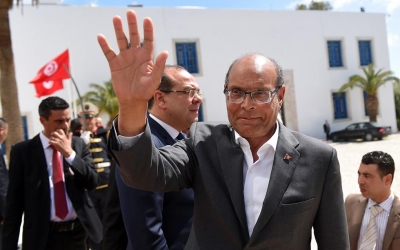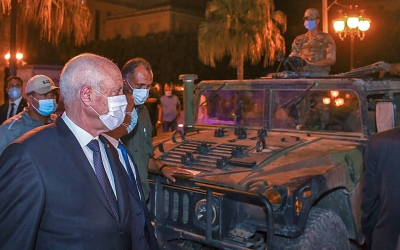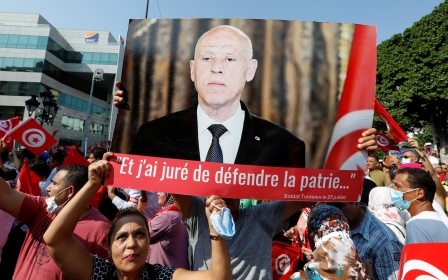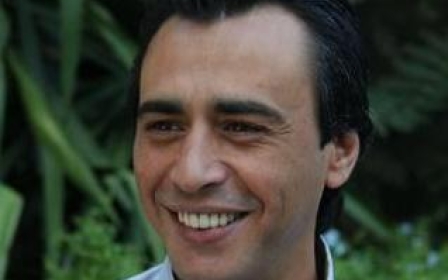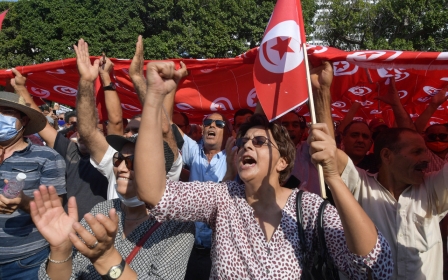Tunisia: US lawmakers slam Kais Saied as he cements one-man rule
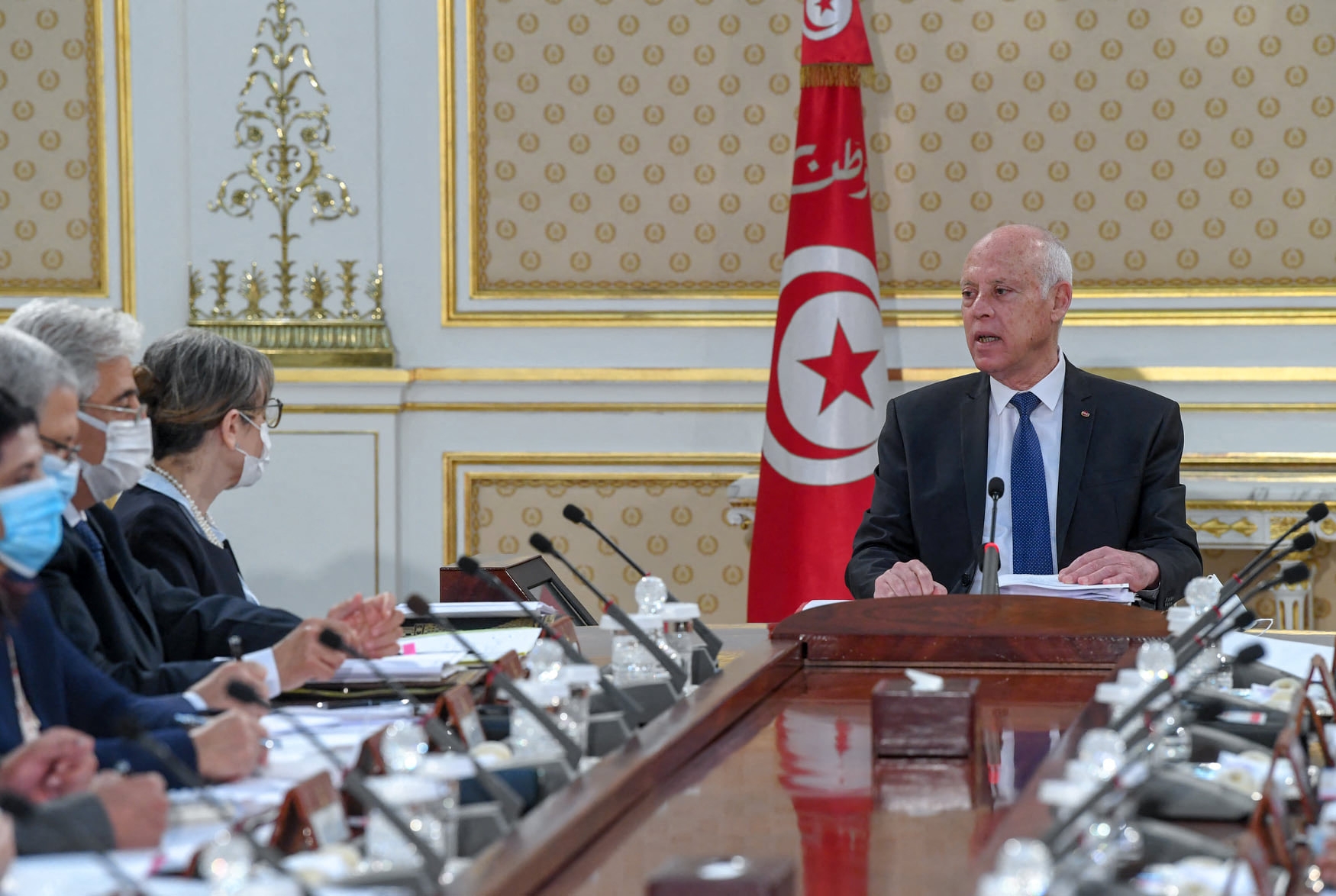
US lawmakers have expressed frustration over the political crisis in Tunisia, with members of Congress criticising President Kais Saied and questioning whether US assistance to the country should be withheld.
At a hearing before the House Foreign Affairs Subcommittee on the Middle East, North Africa and Global Counterterrorism on Thursday, Democratic Congressman Tom Malinowski described recent events in the country as a "coup", while Republican lawmaker Greg Steube declared that "Tunisia's president is not our friend".
Congressman Brian Mast, also a Republican, referred to Saied as "a dictator".
Tunisia descended into a political crisis in late July when Saied, a former constitutional law professor, suspended the country's parliament, sacked the prime minister and granted himself prosecutorial powers, in effect taking full control of the state and sidelining all opposition.
Saied has defended the measures, claiming they were necessary to fight skyrocketing unemployment, rampant corruption, and the coronavirus pandemic. But his political opponents and rights groups have described it as a blatant power grab.
New MEE newsletter: Jerusalem Dispatch
Sign up to get the latest insights and analysis on Israel-Palestine, alongside Turkey Unpacked and other MEE newsletters
"The widespread hope for a democratic future that took root in 2011" in the wake of the Arab Spring "has reverted to either continued authoritarianism or civil war," said Congressman Ted Deutch.
Saied's office released a statement late on Thursday saying the president had expressed his "dissatisfaction" to the US ambassador over the congressional hearing.
Will Todman, a fellow in the Middle East programme at the Center for Strategic and International Studies, told Middle East Eye that the statement was "amazing in how bold it is".
"A comment like that shows the trajectory Saied is on. He is feeling more and more confident with the passing of time," he said.
On Thursday, Saied withdrew the diplomatic passport of former president Moncef Marzouki after he labelled Saied a dictator and told France not to support his "dictatorial regime".
Attacks on the press and opposition have also continued. This month Tunisian police raided news channels and arrested a TV presenter who had made statements critical of Saied.
Recent events have crushed the country's image as the birthplace of the 2011 Arab Spring, with Tunisians the first in the region to rise up against their longtime leader, Zine El Abidine Ben Ali.
In the chaotic years which followed, uprisings in countries such as Syria, Yemen and Egypt were quashed, but Tunisia made democratic gains; adopting a new constitution, strengthening freedom of speech and civil society, and holding elections.
The North African nation, nestled on the shores of the Mediterranean, saw rights groups, NGOs and pro-democracy activists flourish.
In Washington, Tunisia enjoyed broad bipartisan support from Congress and consecutive US administrations, eager to show they could promote democracy and shape governments in the Middle East without getting bogged down in conflict and military campaigns.
'Not seeing results'
Since the Arab Spring, the US has sent $1.4bn in assistance to Tunisia, averaging around $190 million a year since 2016.
Unlike in countries such as Egypt, where the majority of US dollars are dedicated to the military, economic aid has been roughly balanced between security assistance and supporting the economy and democratic institutions.
The US also launched projects such as the Tunisian American Enterprise Fund to promote small- and medium-sized businesses in the country. Eddy Acevedo, a senior adviser at The Wilson Center and a former top USAID official, said the program was, "sort of the largest supporter of [such] businesses in the country".
The United States Agency for International Development (USAID) alone has sent nearly $685m to Tunisia since 2011, while US loan guarantees have allowed the cash-strapped country to access up to $1.5 bn in affordable financing from capital markets.
At Thursday's hearing, several lawmakers - including Malinowski and Kathy Manning - questioned whether US aid efforts had been effective, and considered the impacts of cutting funding to pressure Saied's administration.
"The US has helped the Tunisian people with generous development and security assistance to help grow Tunisia's institutions and improve its economy," Steube said.
"However, we are not seeing the results of our significant US tax dollar assistance today."
Part of the frustration among many lawmakers appeared to be the lack of US leverage over Tunisian politics and Saied.
The European Union is Tunisia's largest trade partner, with nearly 70 percent of its exports going to the bloc. And the promise of more US assistance doesn't appear to be moving the new strongman.
In July the US approved nearly $500m to improve Tunisia's transportation, trade, and water sectors. Because Saied suspended parliament and hasn't yet announced when it will be restored, the country has been unable to ratify the agreement.
Democratic Congressman Bill Keating said "[President Saied] is telling the world right now that he is not going to be effected by any external pressures… that aid and assistance won't be determinative", as he called for the US to coordinate efforts on Tunisia with the EU.
Asked what effect US support has had on Tunisia's democratic transition, Alexis Arieff, an analyst from the Congressional Research Service, told lawmakers that "the success is obviously mixed".
'Really bad repercussions'
With Saied ramping up his efforts to consolidate power, pressure from Congress has been mounting on the Biden administration to take a more assertive position.
Earlier this month, a group of Democratic lawmakers sent a letter to Secretary of State Anthony Blinken asking him to determine whether Saied’s actions constituted a coup, and, if so, to cut US security assistance to Tunisia.
They have been joined by some Republican lawmakers. Speaking on Thursday, Steube said "it is past time for us to revisit and reconsider our foreign assistance to Tunisia."
The North African country is a major US partner in counter-terrorism operations and receives the most security assistance of any country within the area of US Africa Command.
The Obama administration in 2015 named it a major non-Nato ally.
But witnesses at the hearing cautioned lawmakers against cutting security assistance.
Amna Guellali, deputy regional director for the Middle East and North Africa at Amnesty International, said such a move could backfire, given that Saied still enjoys broad popularity within the country.
"It would be considered really as cutting ties also with the Tunisian people," she said, as she warned about possible deterioration of the country's security environment.
"It would have really bad repercussions… not only in Tunisia, but also in the entire region."
Some 6,000 Tunisians joined the Islamic State (IS) group during its peak, the highest per capita number in the world.
Acevedo warned lawmakers that, given the compounding economic and political crisis in the country, Tunisia could once again become a "hotpot of recruitment" for extremists.
Middle East Eye delivers independent and unrivalled coverage and analysis of the Middle East, North Africa and beyond. To learn more about republishing this content and the associated fees, please fill out this form. More about MEE can be found here.


